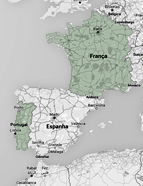

The SPHC [Portuguese Society of the History of Civilization] was a historiographical institutionalization project conceived in 1947 by Vitorino Magalhães Godinho, who wished to implement in Portugal the theoretical foundations and research practices that characterised the historians organised around the Annales journal, and the institutions emerging on the social sciences scene in France associated with that journal. For reasons that are still unclear today, the SPHC did not go beyond its initial project phase and therefore its influence on Portuguese historiography was highly limited. Even so, it was one of the rare examples of an attempt to organize research in history outside the network of institutions under the tutelage and funded by the Estado Novo [New State], with the clear goal of renewing methods, themes and perspectives in the study of the past.
The history of the SPHC is inseparable from the academic path of its main promoter, Vitorino Magalhães Godinho. After leaving the Faculdade de Letras da Universidade de Lisboa [Faculty of Arts of the University of Lisbon] in 1944 - and after some years dedicated to teaching private courses, publishing, translating and editing history works, but also to participating in political opposition movements (Sousa, Vitorino Magalhães Godinho..., 2012) - he established epistolary contacts from 1946 with Lucien Febvre and Fernand Braudel through the Hispanist Marcel Bataillon. The following year, as a result of these contacts, he obtained a scholarship at the Centre National de la Recherche Scientifique, to which the work of the Lusitanian Pierre Hourcade, then director of the Institut Français au Portugal, also contributed (Godinho, Do ofício e da cidadania... [On the profession and citizenship], 1990, p. 50).
Magalhães Godinho's arrival in Paris coincided with a favourable scenario for the renewal of historical studies in France, with the emergence of new research institutions that were not dependent on universities and that welcomed researchers wishing to embark on new thematic and methodological paths (Gemelli, Fernand Braudel, 2005, p. 155; Picard, "Enseignement supérieur et recherche, 2010, pp. 146-148). The most successful institution was section VI of the École Pratique des Hautes Études, founded in 1947 with an interdisciplinary perspective where history coexisted with other social science disciplines.
